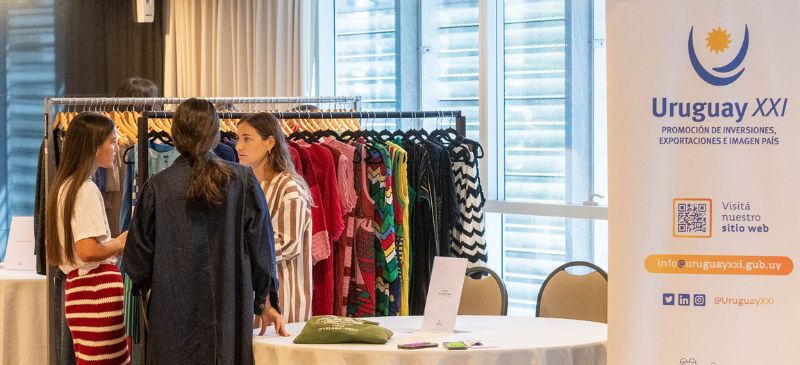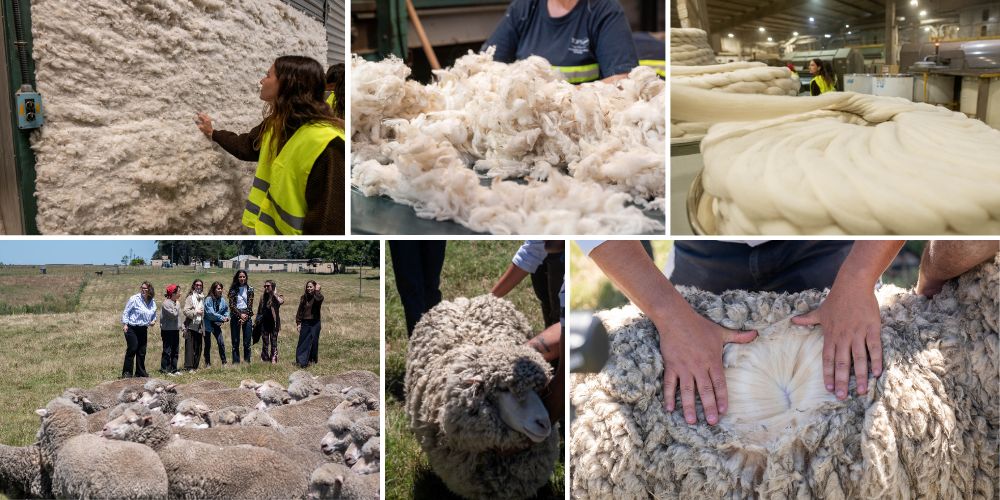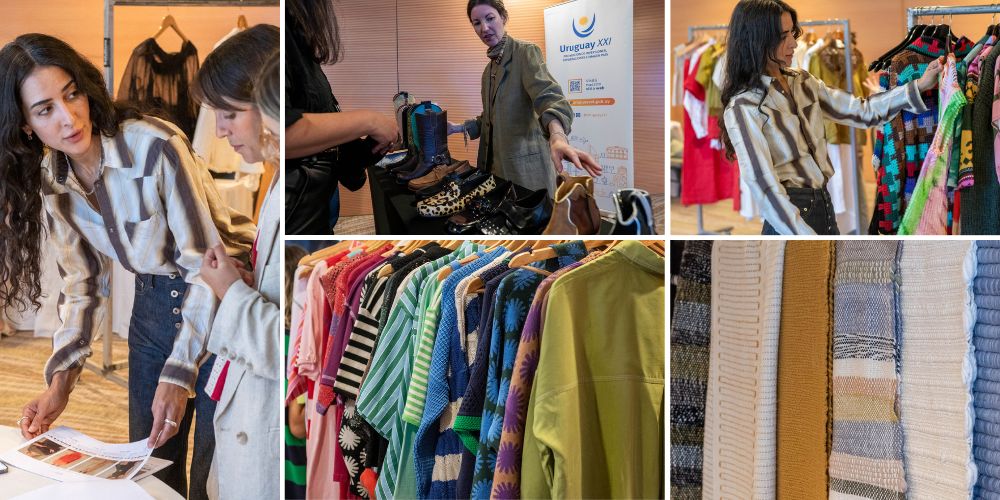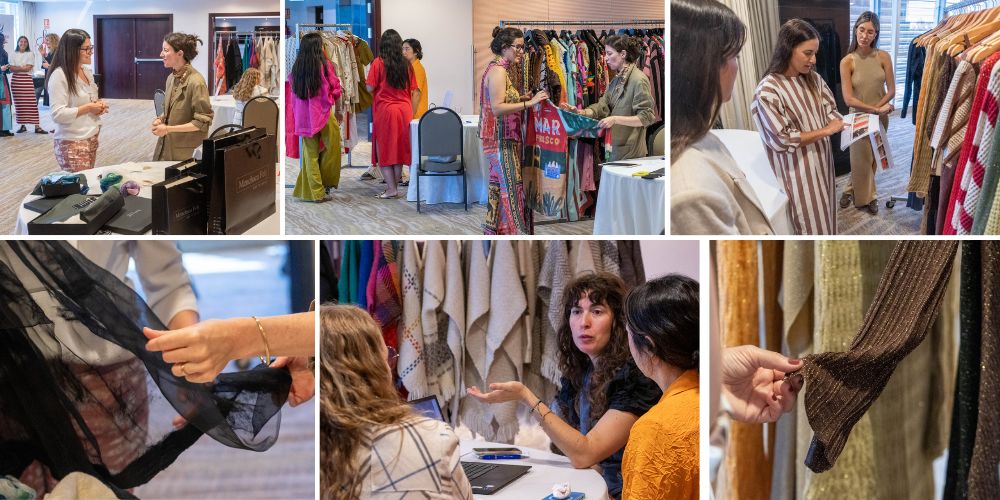- Home
- About us
- News
- Events
- EXPORT Export
-
BUY
Buy
Buy
- INVEST Invest
- COUNTRY BRAND Country Brand
-
INFORMATION CENTER
Information center
InformationCenterInformationCenterReports Country reports Department reports Foreign trade reports Product-Destination worksheet Sectors reports Work documentsStatistical information Classification Uruguay XXI Exports Imports Innovative National Effort Macroeconomic Monitor Tools Buyers Exporters Investors
- Contact
-
Languages
International experts highlight sustainability and the creative talent of Uruguayan fashion
Agents, consultants and foreign fashion representatives got to know the Uruguayan wool ecosystem and met with local brands to guide their international expansion.
Share:

The sustainable creativity of Uruguayan slow fashion was showcased to fashion agents and representatives of international showrooms who recently visited the country as part of a mission organized by Uruguay XXI with the support of the Uruguayan Chamber of Design (CDU). The experts learned first-hand about the country's wool production system during a tour organized by the Uruguayan Wool Secretariat (SUL) and met with 35 apparel, shoe, accessory and jewelry brands, giving them feedback to help them position their products in the U.S. market.
“I am impressed by the integrity and honesty of Uruguayan products. It's great to see the traceability, to know where the yarn came from, the responsibilities involved in the process, and the passion they put into it,” said Research and Development director Candice Clark, as she toured the Tops Fray Marcos combing facility. The fashion agency she heads specializes in selling international brands in the U.S. and Canadian markets and supporting those seeking a global presence.
The tour of the combing plant, where the agents had a close look at the washing and conditioning of the wool, was part of the Wool Tour attended by the agents. It also included a tour of wool production fields and face-to-face meetings with producers. The activity generated curiosity, admiration and exchange of information about the processes and the strict animal welfare protection standards, established long ago and reflecting the country's pioneering commitment to these issues. In addition, the group was able to observe first-hand the use of wool by-products, used by the cosmetics industry, together with the care and recycling practices of the water used to wash the wool.
Find out more about the Uruguayan wool sector here.

Creative identity
The five agents completed an agenda of meetings with 35 Uruguayan brands to which they offered their insights about their products and an expert look at how to adapt them to the needs of the U.S. market.
For example, the clothing and accessories brand Gia, which specializes in leather accessories and hand-woven overalls, is now focused on internationalizing its brand, and the feedback from the agents helped its director Giuliana Aguilar to understand where she should direct her efforts, with a view to attending international showrooms.
Gia, who sells through her website, makes crochet knit garments that are organically dyed with well water and yerba mate, tree bark or walnut shells - depending on the season - giving her fabrics natural tones greatly enhanced by the creativity of their author.
“The landscape, the honesty of the materials, the work ethic and the care so inherent in the work translates beautifully into these talented garments,” explained Candice Clark, who held a meeting with Gia.
Uruguayan Gimena Burgos' firm, which is dedicated to textile production and printing for various designers and artists, launched a capsule collection of apparel last year to try selling in the United States. The exchange she had with Megan Mah-Bentov, an expert in design and retail, “opened her mind” about what else they could produce for this new public they aspire to reach.
Brands with a solid trajectory, such as Margara Shaw, Manos, The Farra and Ound, participated in the round of meetings along with others that, although consolidated, are taking their first steps towards internationalization. Among the 35 firms that received recommendations from the sector experts were Tenaz, specialized in leather accessories, Rosa Rosa, focused on designer shoes, and others such as Pastiche, Celmo, Savia, Humi, Babila, Texturable, Jibona, Mandinga, Lucha, Manu Be, Agnes Lenoble, Inés Ott, Loria Studio, Sierra Mora, Uruguay de Campo, Gimena Damiano, Dod Laserta, Milo, Floralia, Menchaca Felt, La Capitana, Hand, Pura Lana and the jewelry brand Aziza.

Wool is the star
“I was meeting with incredibly talented brands. You can see that the designers and manufacturers have a lot of pride in what they do and that there is a beautiful synergy between the brands, who collaborate creatively by introducing colors and prints in a very interesting way. Wool is the star obviously and it's beautiful that it comes from practices that protect animal welfare,” said Catherine Lerer, a sustainable fashion expert who advises brands on strengthening their businesses.
Sustainability and integrity in the production process of Uruguayan apparel was highly valued by the experts, who placed special emphasis on the need to tell the story behind each product and to build trust.
“Consumers begin to be more aware of the origin of products when the story behind them is shared with them. That's why it's important to dialogue with designers, understand the brand's past and, once they know the country and its resources, they are surprised to discover aspects such as sustainability and social impact. It is up to the designer to tell that story and engage buyers,” Sabrina Reales, founder of Selaer Studio, a fashion agency whose mission is to foster solid and sustainable growth for its designers, told Uruguay XXI.
“It's wonderful to hear directly from producers, creators and suppliers about the production process. This level of trust is what we need to transmit to our buyers,” said Nancy Rosenbloom, wholesale consultant.
The mission organized by Uruguay XXI is part of an ongoing effort to position Uruguayan textile design and production in international markets. This meeting was a sample of the potential of Uruguayan design to attract new audiences and reaffirm its identity in the demanding world of global slow fashion.

